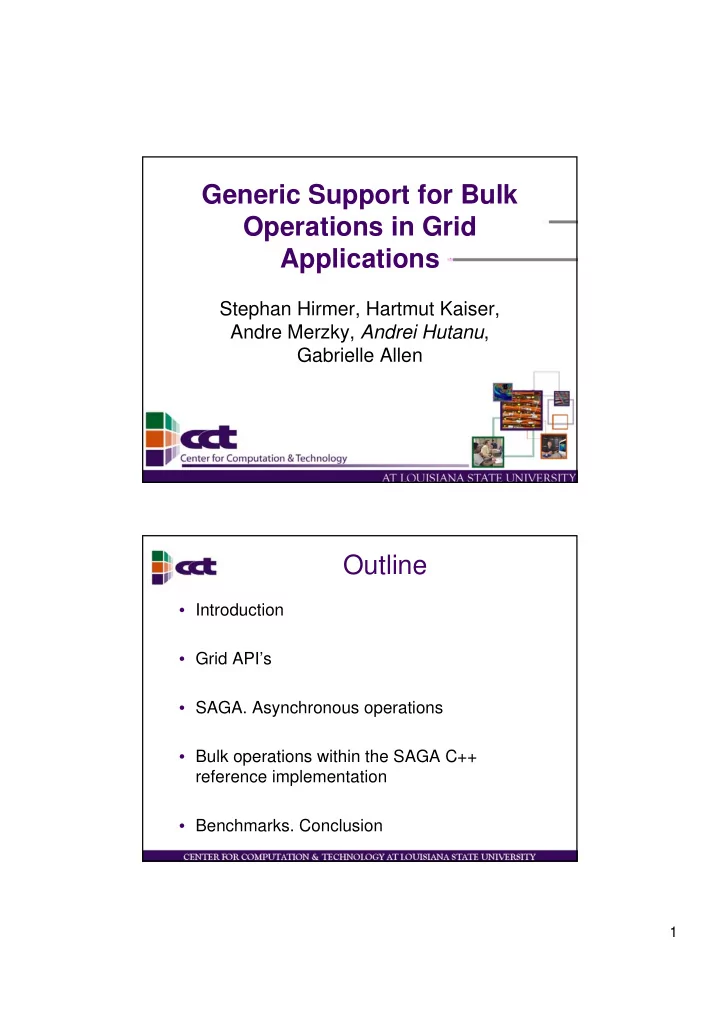

Generic Support for Bulk Operations in Grid Applications Stephan Hirmer, Hartmut Kaiser, Andre Merzky, Andrei Hutanu , Gabrielle Allen Outline • Introduction • Grid API’s • SAGA. Asynchronous operations • Bulk operations within the SAGA C++ reference implementation • Benchmarks. Conclusion 1
Introduction • Latencies associated with invocation of remote operations and inter-process communication affects performance • One way to deal with this : cluster related operations in a single operation : bulk operation • Issue is that some component between the user and the middleware needs to do this optimization : usually the user Grid APIs • Naturally concerned with performance problems • They usually offer means to hide the latency such as asynchronous operations (tasks) or bulk operations • SAGA : OGF application-oriented standard – 80:20 rule. 80% functionality with 20% effort (complexity) 2
SAGA • Covering : file access, replica management, job submission and control, and data streaming. • API needs to be simple : optimizations are not exposed to the user • However some use cases require these optimizations : need to show that they can be integrated while keeping the simplicity of the API SAGA Architecture 3
Requirements for bulks • Need two types of information – Information about task dependencies: what tasks are independent and can be run as a bulk – Information about the tasks themselves: which tasks are similar enough so that it makes sense for them to run together Asynchronous operations in SAGA – Tasks • Handles to asynchronous function calls • run(), wait(…), cancel(), get_state() – Task Container • Concept to handle a group of async. function calls. • add_task(…), remove_task(…), run(), wait(…), … – Task Bulks • A set of arbitrary tasks, sharing common properties. 4
Example code vector<string> files = …; saga::task_container tc; //create file copy tasks while (files.size()) { saga::file f (files.pop()); tc.add(f.copy<saga::task> (“/data/”)); } //run all tasks tc.run(); //wait for all tasks tc.wait(); Requirements, refined • Explicit asynchronous API – Synchronous operations are not considered • Information about task (non)dependencies – Implicitly provided by the container class • Information about task similarities – No requirements on the API but the implementation should allow inspection of the remote operation 5
Architecture of our system Adding meta-information • Not just a function pointer : Need to have access to information about the executed method (function name, parameter values, class name and instances) • All this stored in the task and used as a basis for clustering heuristics 6
Task Analyzing & bundling • task_container::run() used as entry point: – using meta-information for analysis – bundling “similar” tasks together • according to different clustering strategies: Task execution • Using a standard selection tool an adaptor is selected. The adaptor tries to execute all the tasks using its specialized bulk handling • returns a subset (may be empty) of tasks he couldn’t execute • new bulk-adaptors are selected until all bulks are executed • if necessary, fall back to one-by-one execution. 7
Prototype implementation • SAGA engine was extended to allow harvesting of semantic information for operations • Important measure : overhead of bundling and analyzing the tasks • Important to note : this is for optimizing the invocation of the operations, not the operations themselves • Example adaptor : interfaces to a GridFTP-based file copy (GSI) service Benchmarks – Introduced sorting overhead – SAGA initiated bulk handling vs. direct middleware invocation. – SAGA initiated bulk handling vs. SAGA initiated async. function calls. 8
Benchmarks – Introduced sorting overhead – SAGA initiated bulk handling vs. direct middleware invocation. – SAGA initiated bulk handling vs. SAGA initiated async. function calls. Benchmarks – Introduced sorting overhead – SAGA initiated bulk handling vs. direct middleware invocation. – SAGA initiated bulk handling vs. SAGA initiated async. function calls. 9
Benchmarks – Introduced sorting overhead – SAGA initiated bulk handling vs. direct middleware invocation. – SAGA initiated bulk handling vs. SAGA initiated async. function calls. Benchmarks – Introduced sorting overhead – SAGA initiated bulk handling vs. direct middleware invocation. – SAGA initiated bulk handling vs. SAGA initiated async. function calls. 10
Conclusion • Bulk optimizations could be done within SAGA • Three requirements for generic bulk optimizations in API implementations: – Asynchronous API – Explicit information about task dependencies – API implementation must be able to inspect the tasks in order to find similar tasks • Benchmarks: – Minor overhead introduced, but not neglectable 11
Recommend
More recommend